
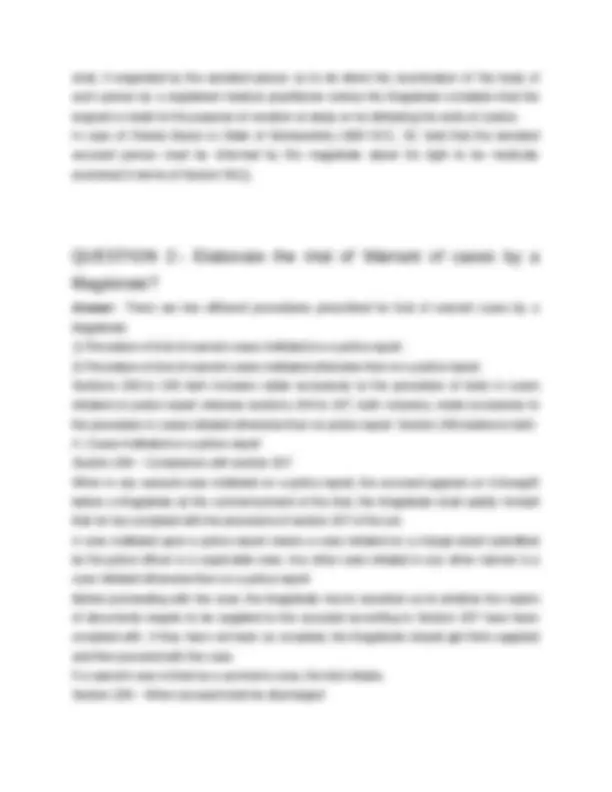
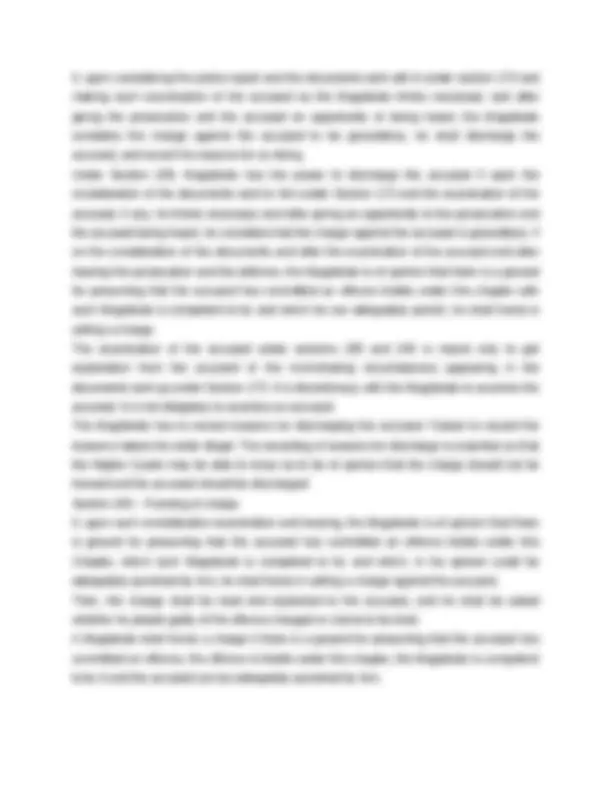


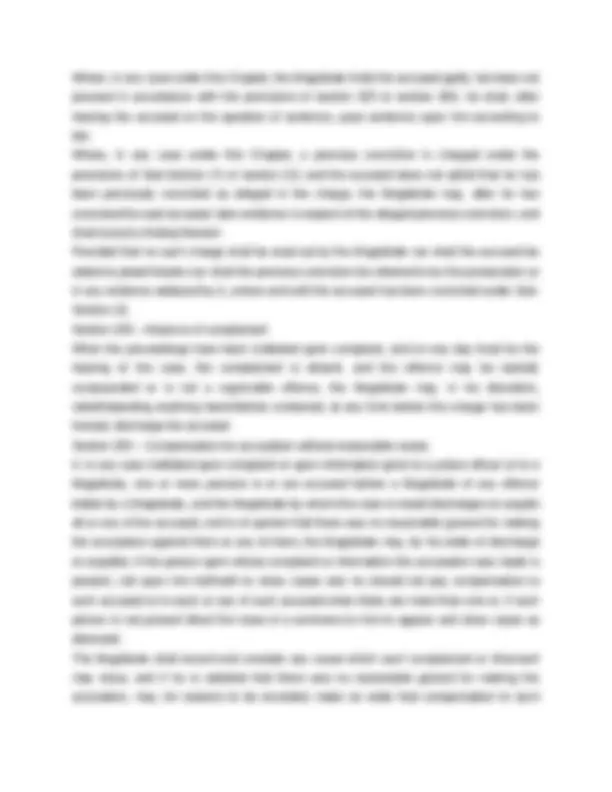

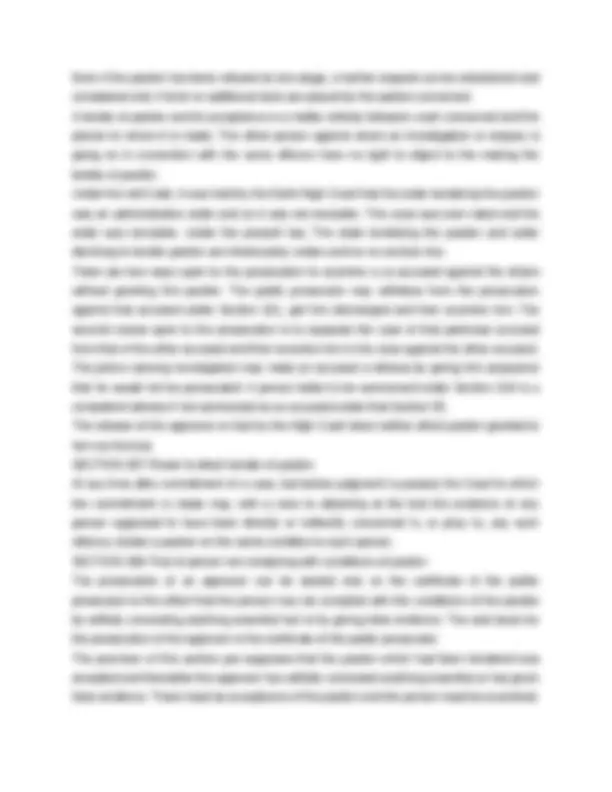

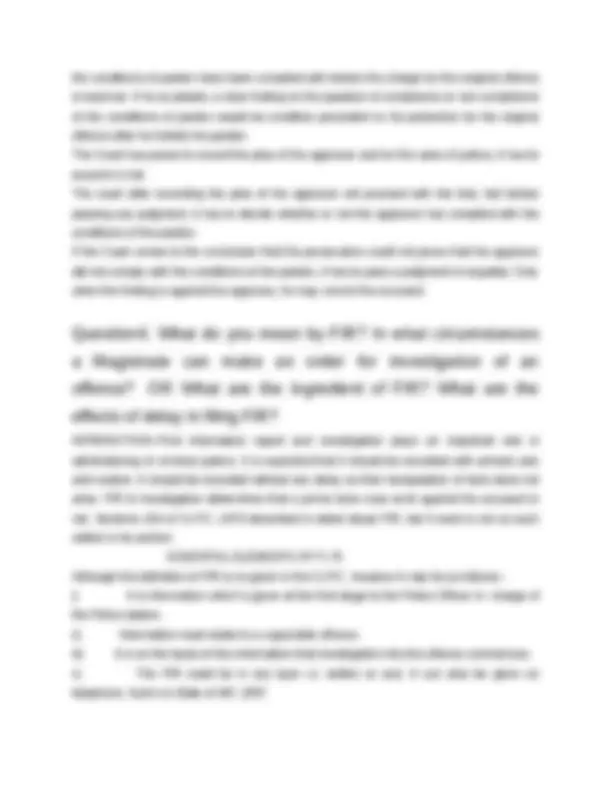
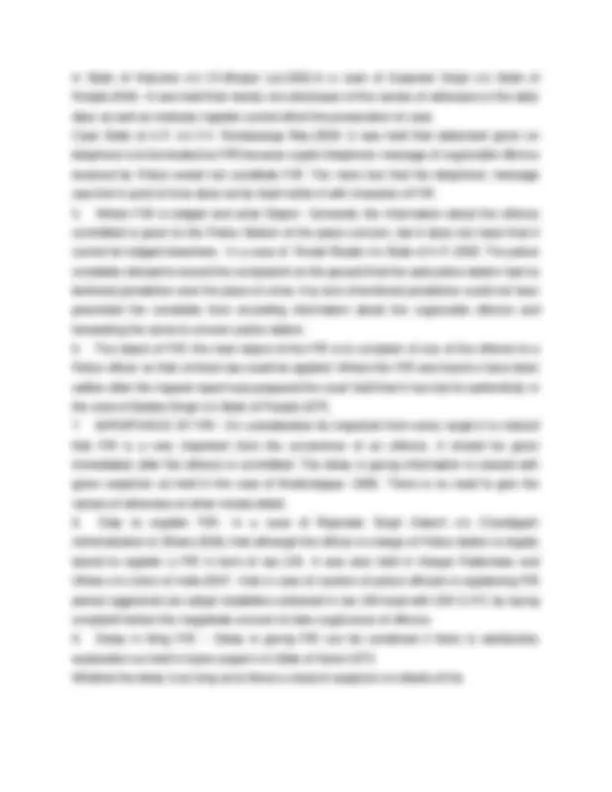
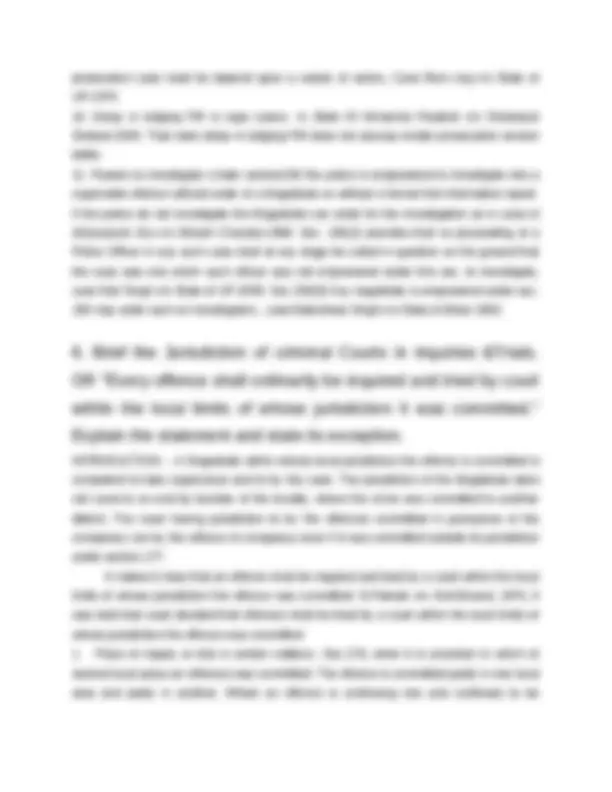
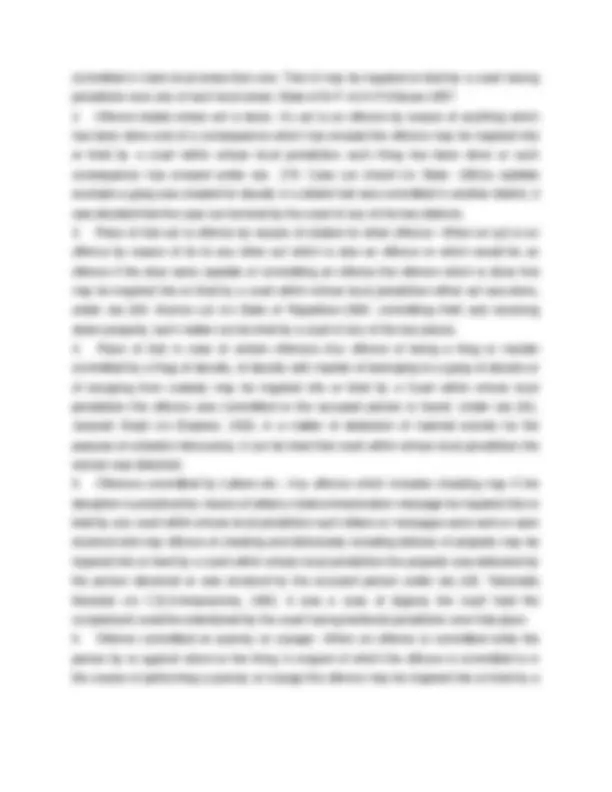
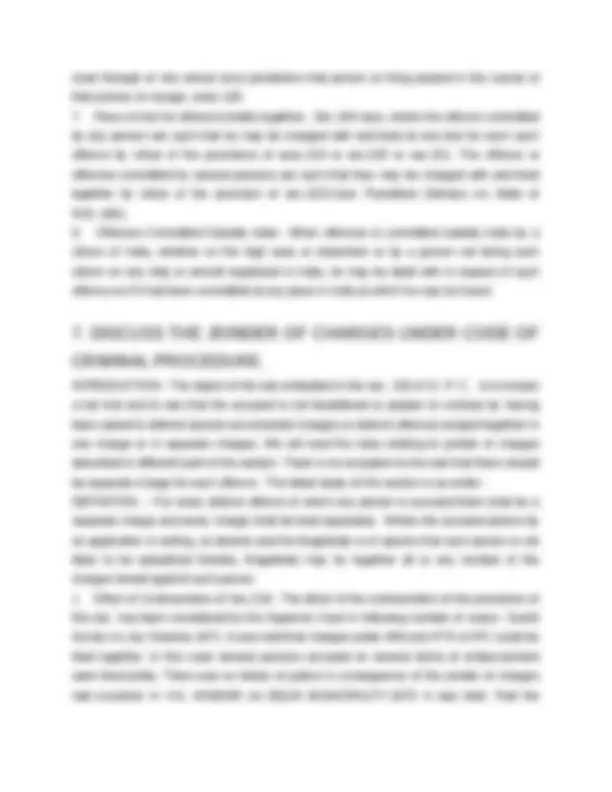
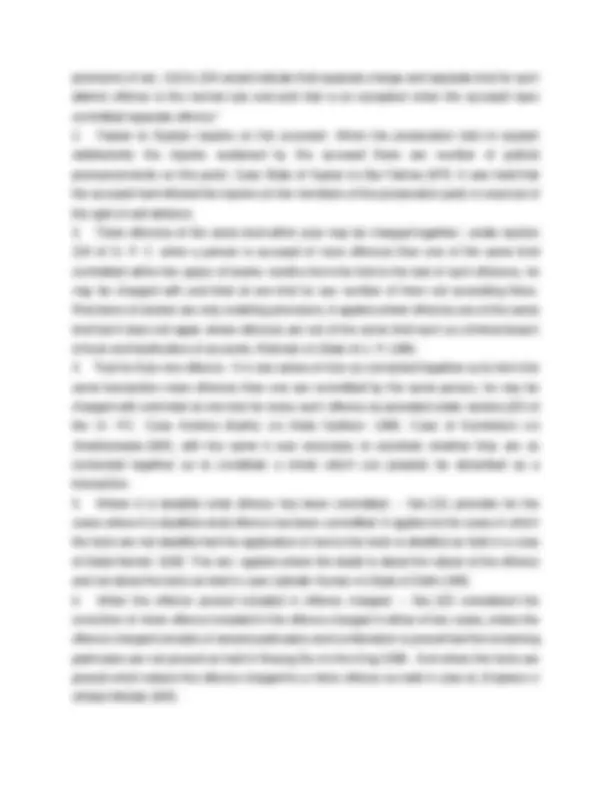
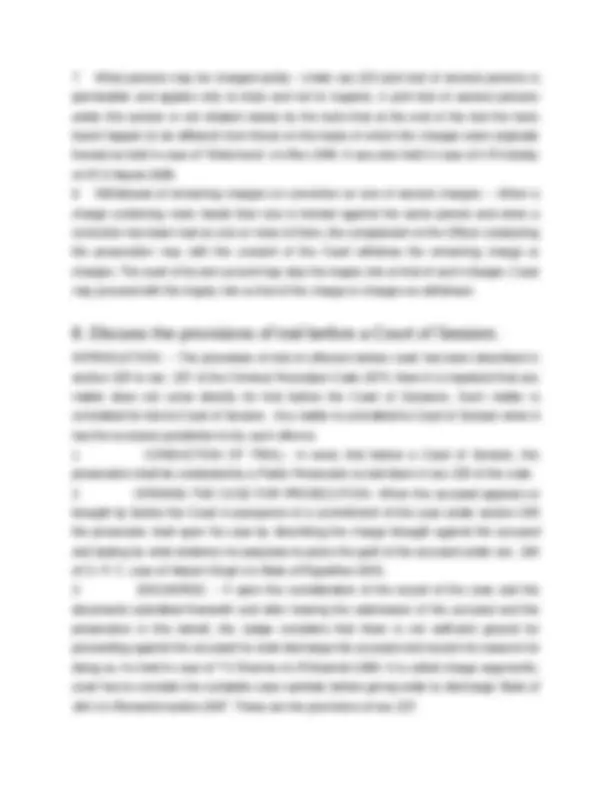
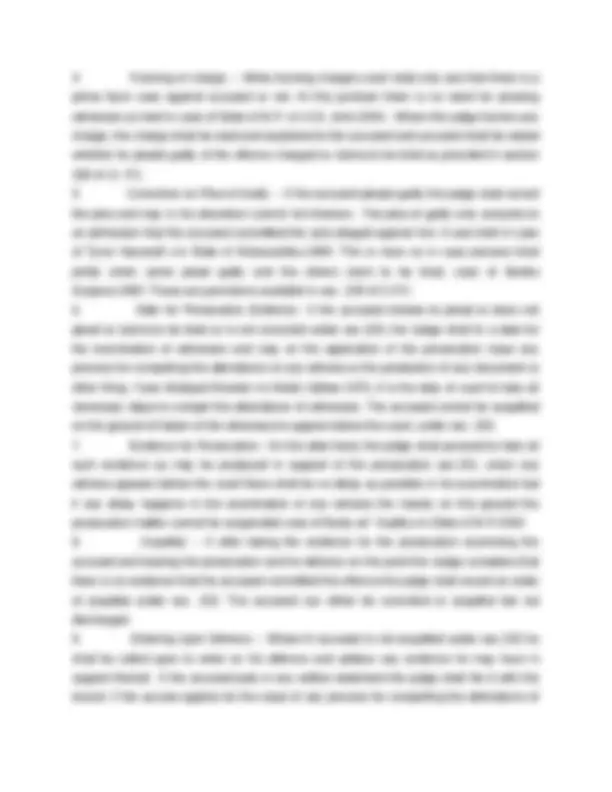
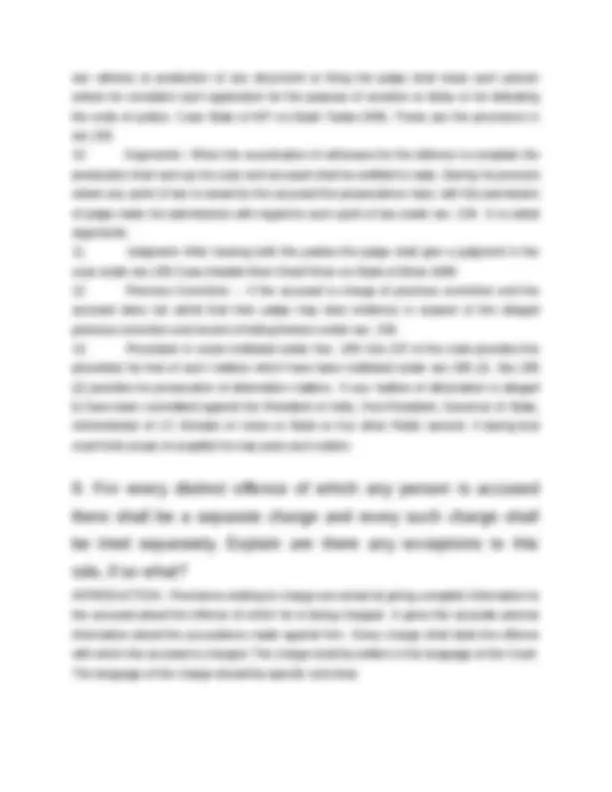
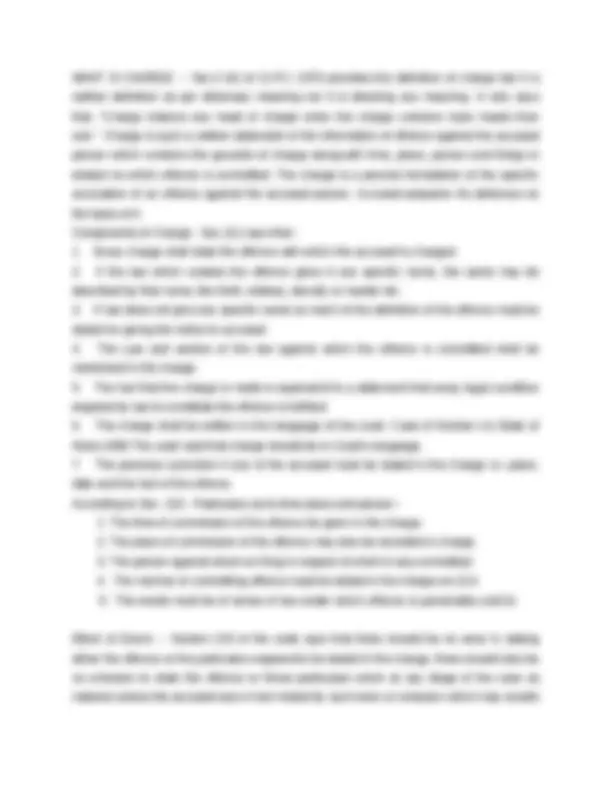

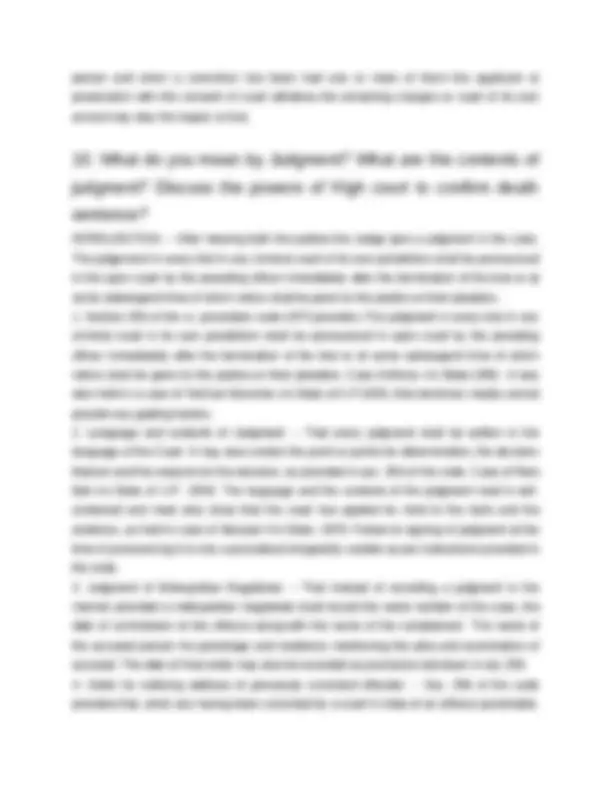
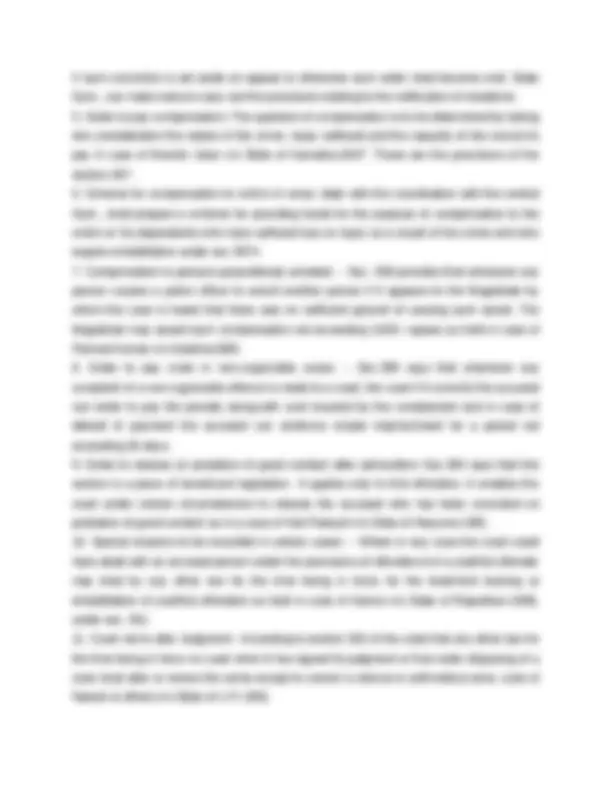
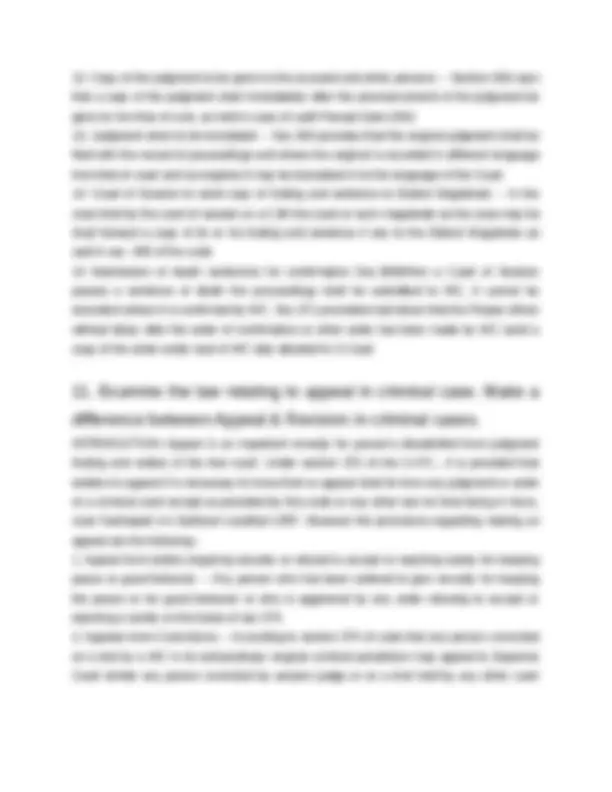
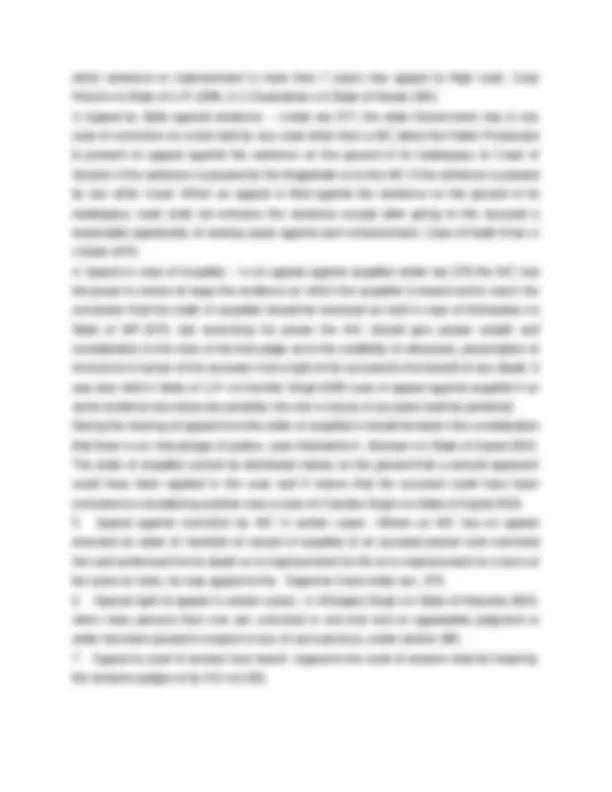
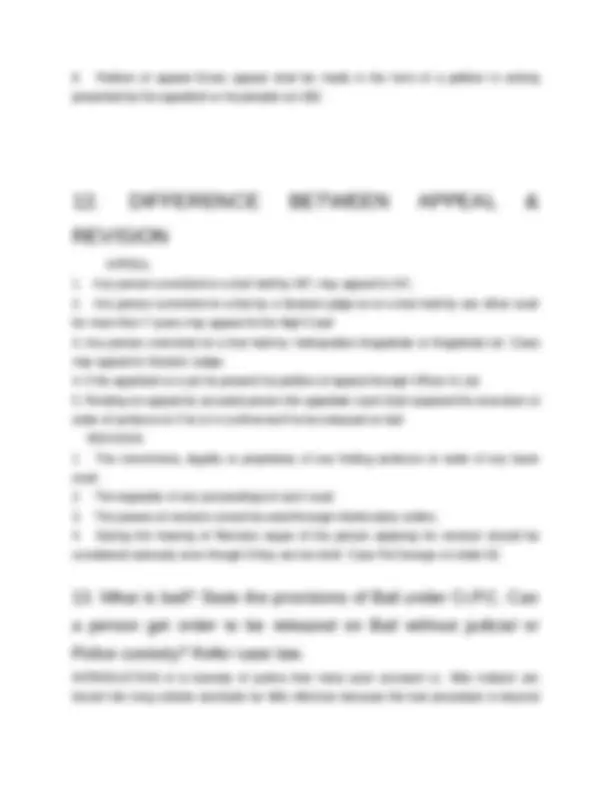
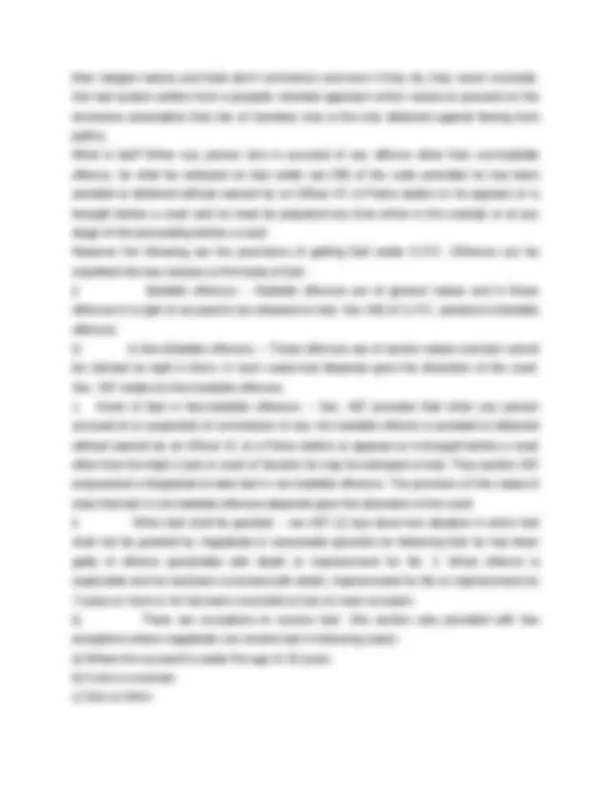
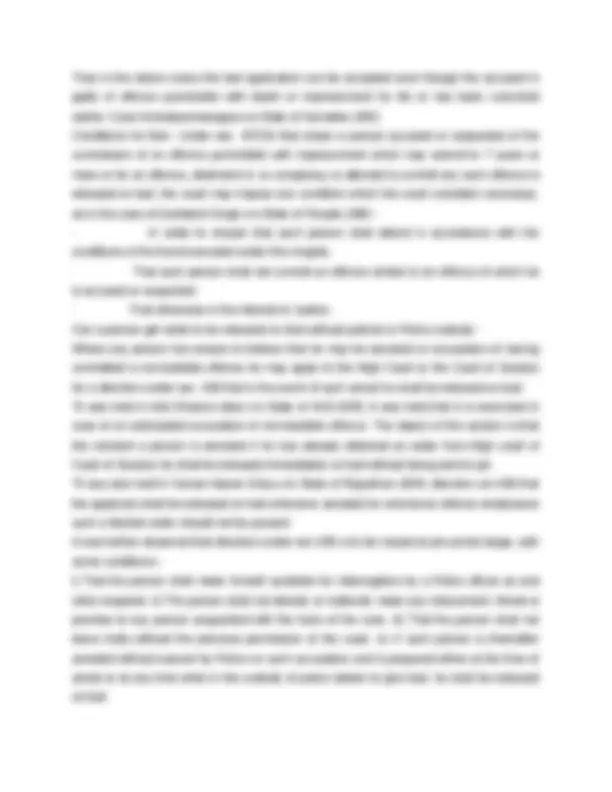

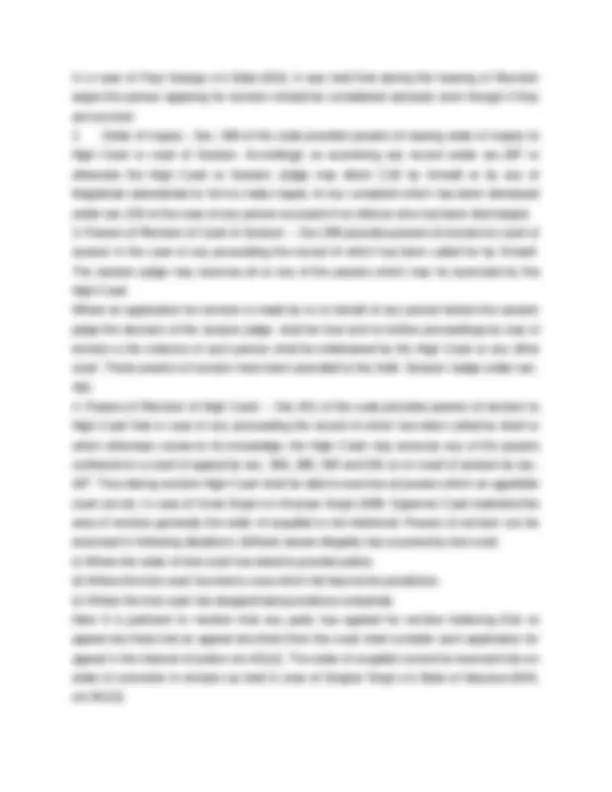
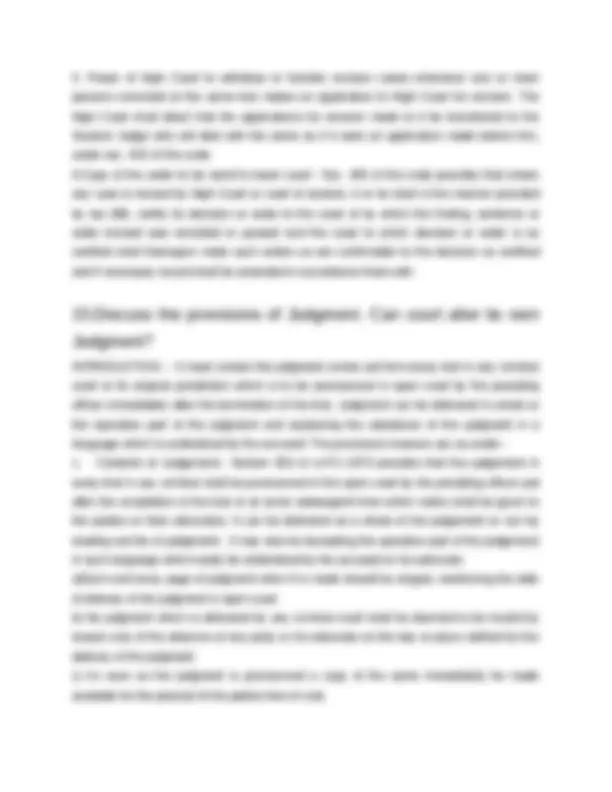
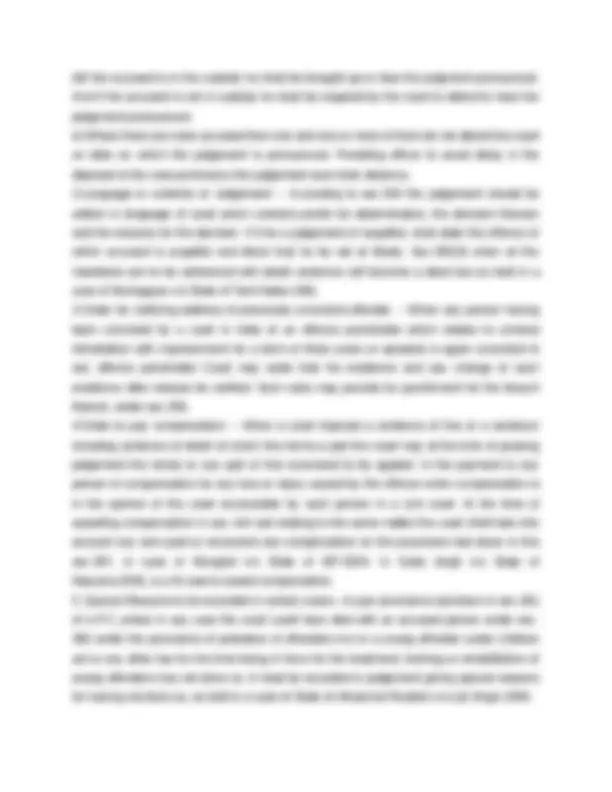
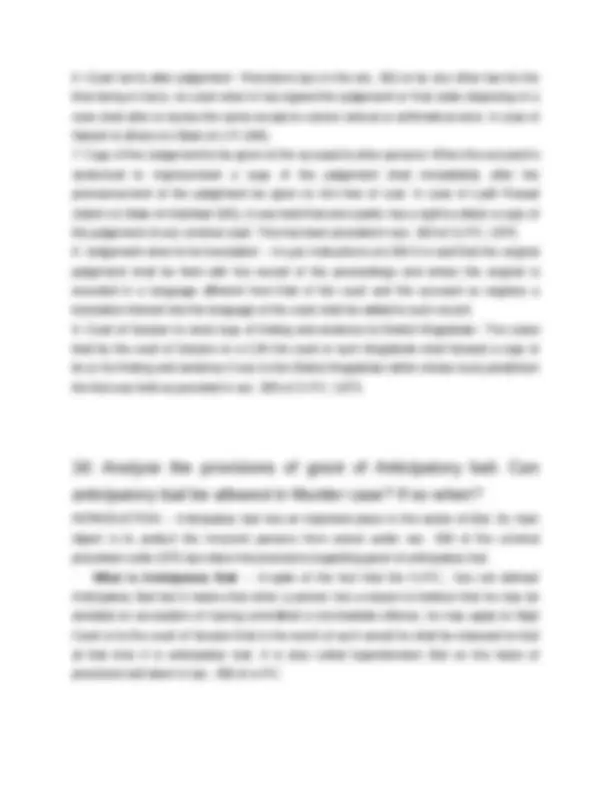

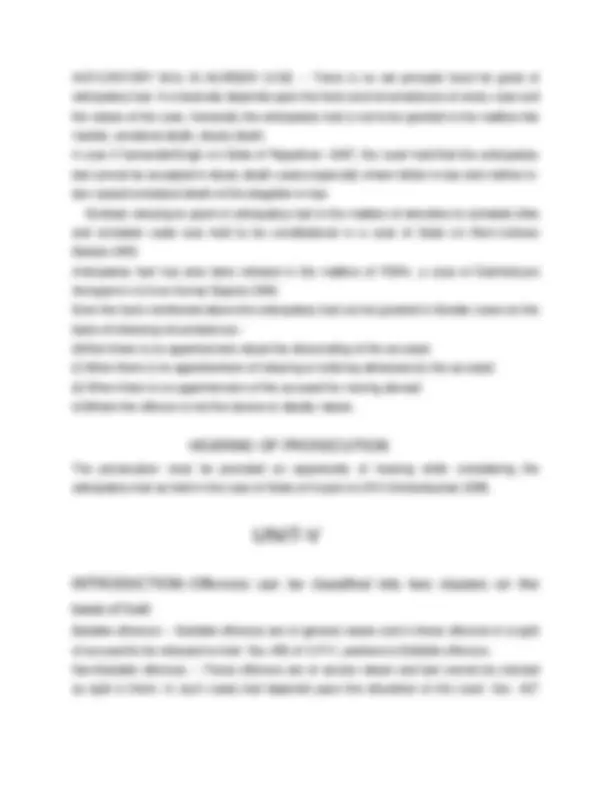
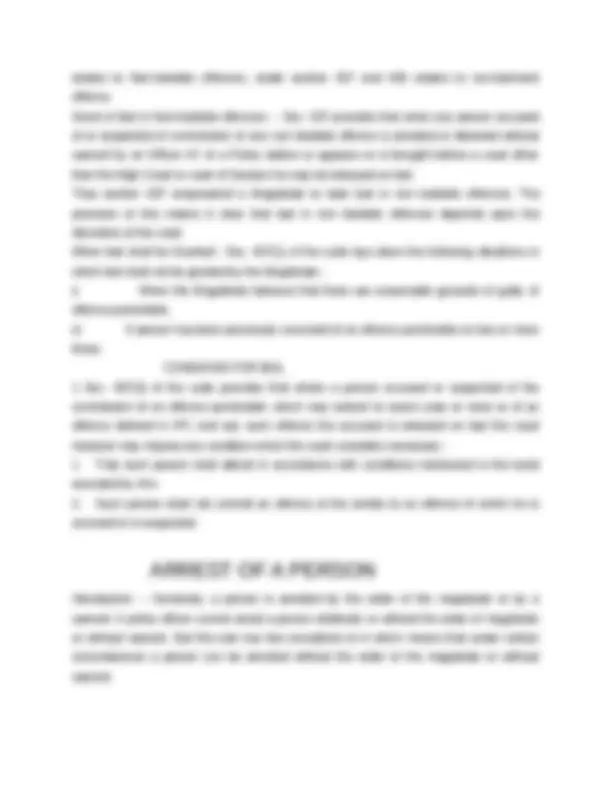
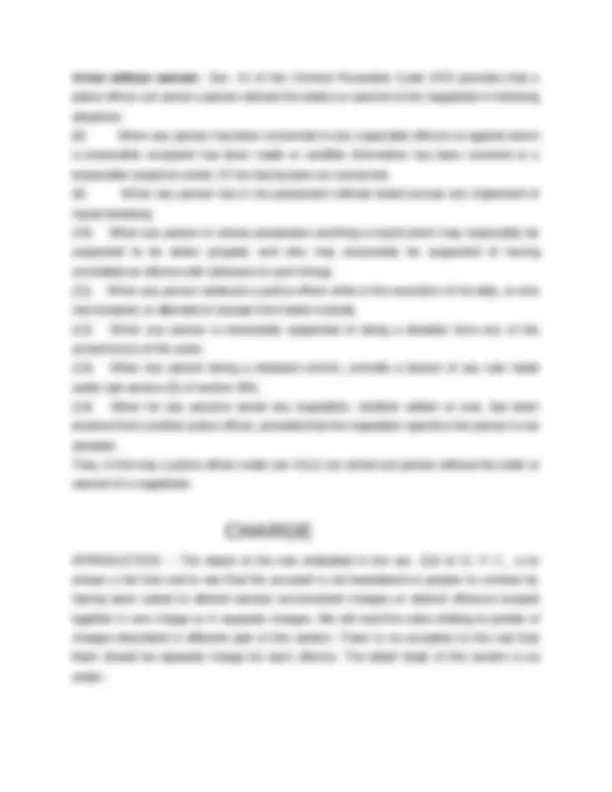
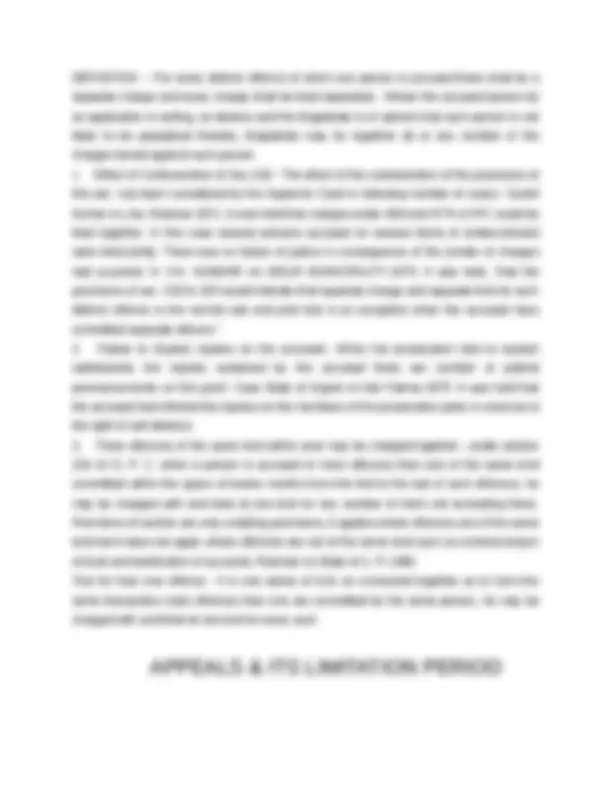
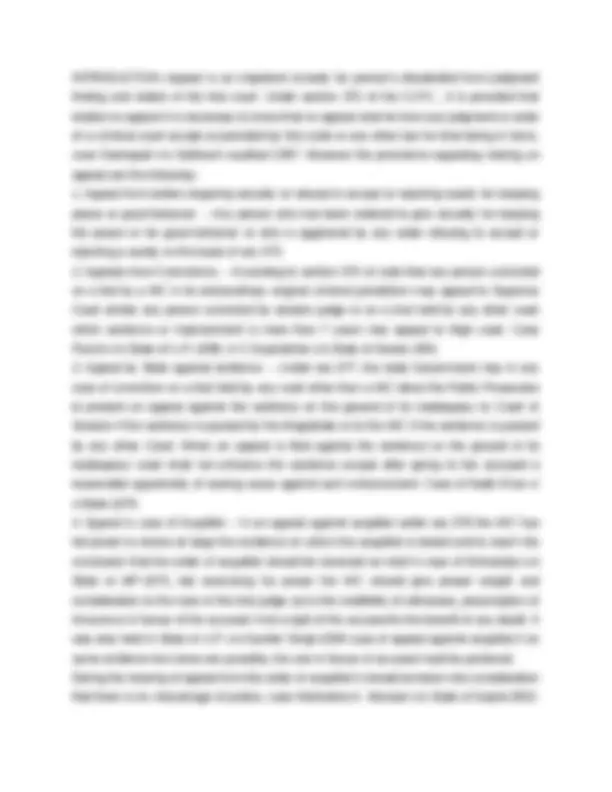
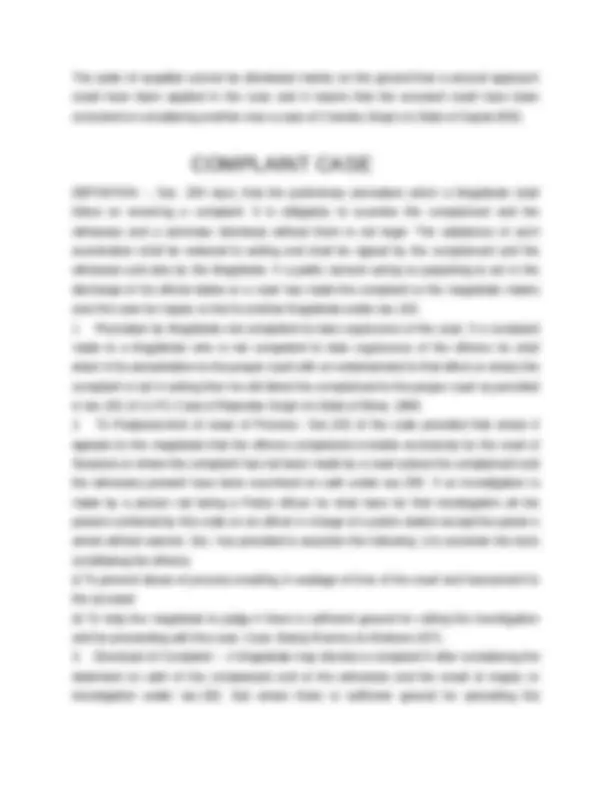
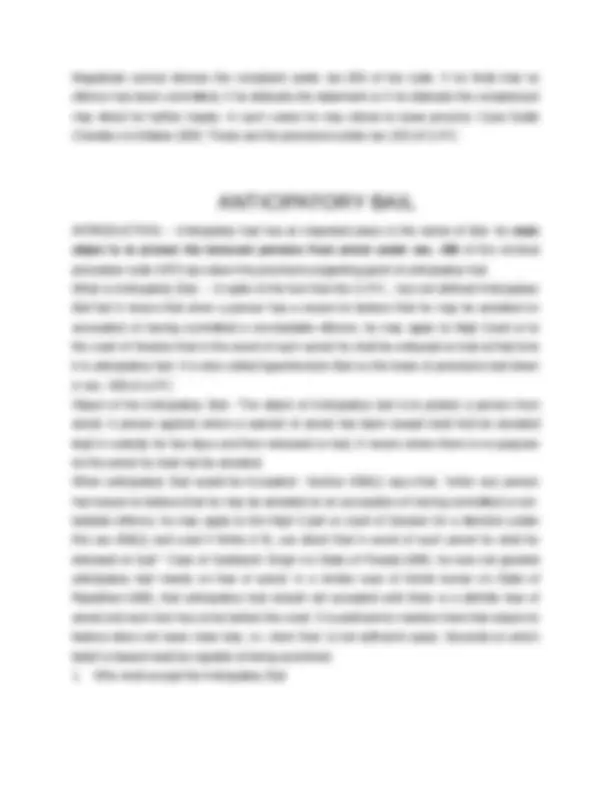
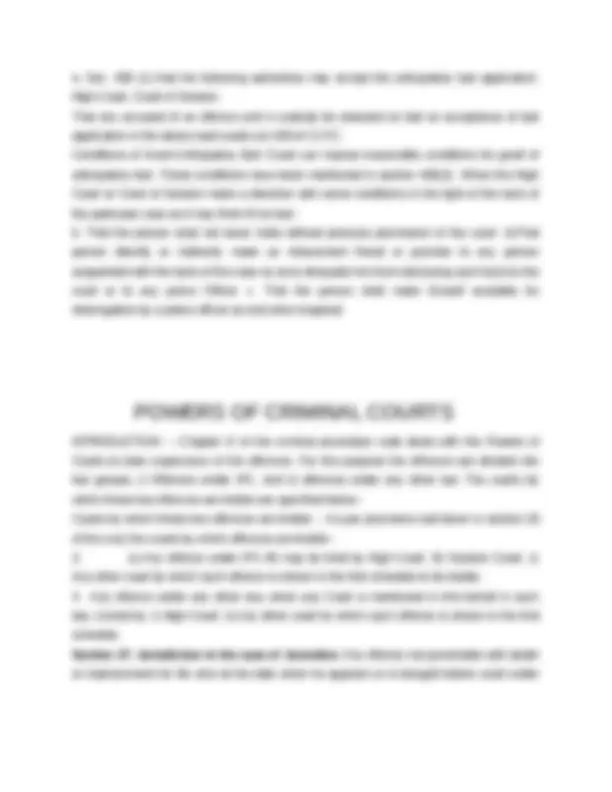
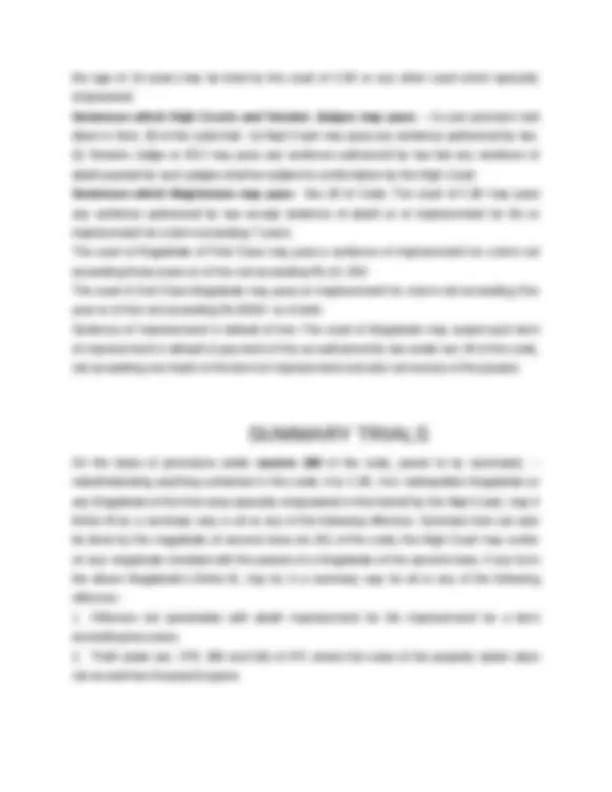
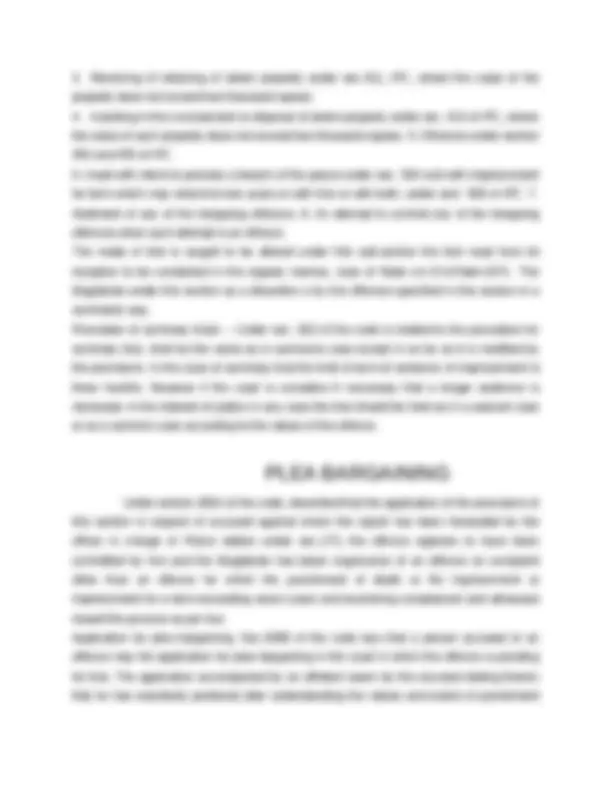



Study with the several resources on Docsity

Earn points by helping other students or get them with a premium plan


Prepare for your exams
Study with the several resources on Docsity

Earn points to download
Earn points by helping other students or get them with a premium plan
Community
Ask the community for help and clear up your study doubts
Discover the best universities in your country according to Docsity users
Free resources
Download our free guides on studying techniques, anxiety management strategies, and thesis advice from Docsity tutors
Key words of criminal procedure code and juvenile justice act
Typology: Lecture notes
1 / 51

This page cannot be seen from the preview
Don't miss anything!












































Criminal Procedure Code – CrPC Notes
ANSWER :- Cr P C gives powers to the police for arresting a person with such power Cr P.C also provides rights to an arrested person. Rights of an arrested are as follows –
Further, in case of, Sharifbai vs Abdul Razak, AIR 1961, SC held that if a police officer fails to produce an arrested person before a magistrate within 24 hours, he shall be held guilty of wrongful detention.
If, upon considering the police report and the documents sent with it under section 173 and making such examination of the accused as the Magistrate thinks necessary and after giving the prosecution and the accused an opportunity of being heard, the Magistrate considers the charge against the accused to be groundless, he shall discharge the accused, and record his reasons for so doing. Under Section 239, Magistrate has the power to discharge the accused if upon the consideration of the documents sent to him under Section 173 and the examination of the accused, if any, he thinks necessary and after giving an opportunity to the prosecution and the accused being heard, he considers that the charge against the accused is groundless. If on the consideration of the documents and after the examination of the accused and after hearing the prosecution and the defence, the Magistrate is of opinion that there is a ground for presuming that the accused has committed an offence triable under this chapter with such Magistrate is competent to try and which he can adequately punish, he shall frame in writing a charge. The examination of the accused under sections 239 and 240 is meant only to get explanation from the accused of the incriminating circumstances appearing in the documents sent up under Section 173. It is discretionary with the Magistrate to examine the accused. It is not obligatory to examine an accused. The Magistrate has to record reasons for discharging the accused. Failure to record the reasons makes the order illegal. The recording of reasons for discharge is essential so that the Higher Courts may be able to know as to be of opinion that the charge should not be framed and the accused should be discharged. Section 240 – Framing of charge If, upon such consideration examination and hearing, the Magistrate is of opinion that there is ground for presuming that the accused has committed an offence triable under this Chapter, which such Magistrate is competent to try and which, in his opinion could be adequately punished by him, he shall frame in writing a charge against the accused. Then, the charge shall be read and explained to the accused, and he shall be asked whether he pleads guilty of the offence charged or claims to be tried. A Magistrate shall frame a charge if there is a ground for presuming that the accused has committed an offence, the offence is triable under this chapter, the Magistrate is competent to try it and the accused can be adequately punished by him.
A Magistrate can frame a charge in a case where is ground for presuming that the accused has committed an offence triable under this Chapter, that is to say, The offence must be punishable to imprisonment for a period exceeding two years. If the offence which appears to be triable as a summon case, no charge should be framed, though the accused may be tried without framing any charge as a summons case, similarly if the case is triable as a Sessions trial, no charge can be framed by the Magistrate. A Magistrate can frame a charge under Section 240 only when he is competent to try the case. A Magistrate may not be competent to try the case if the offence has been committed beyond the local jurisdiction of his Court. The charge framed shall be read over and explained to the accused and he should be asked whether he pleads guilty or not. Charge shall be read over the accused and not the pleader. It has been held that the charge may be explained to the counsel of the accused and he may be allowed to plead or not to plead on behalf of the accused. But this view is not correct. The charge has to be explained to the accused and the accused has to plead guilty or not. Section 241 – Conviction on plea of guilty If the accused pleads guilty, the Magistrate shall record the plea and may, on his discretion, convict him thereon. If the accused pleads guilty, the Magistrate should record his plea in his own words and clearly. The Magistrate has discretion to convict an accused on his plea of guilty. But the plea of guilty must be clear. It is admission of all the facts on which the charge is founded and also the admission of guilt in respect of them. When the accused pleaded not guilty at the time of charge being read over to him and the Magistrate proceeded to take evidence but afterwards the accused accepted the guilt, it was held that he could not be convicted under Section 241. The plea of the accused must be recorded as much as possible in the very words of the accused so that the higher courts may determine whether the plea of the accused really amounted to a confession of the guilt. Section 242 – Evidence for prosecution If the accused refuses to plead or does not plead, or claims to be tried or the Magistrate does not convict the accused under section 241 the Magistrate shall fix a date for the examination of witnesses.
the prosecution fails to take steps and does not produce evidence, the court may close the prosecution evidence and proceed further and may acquit the accused. The term examination means the examination, cross-examination and re-examination. Consequently, when a witness is examined by the prosecution on the date fixed for taking evidence, the witness has to be cross-examined by the accused. But in suitable cases the Magistrate may postpone the cross-examination of a witness who has been examined by the prosecution till other witness or witnesses have been examined. This provision is for the benefit of the accused to give him opportunity to cross-examine all the witnesses in continuation. Section 243 – Evidence for defence The accused shall then be called upon to enter upon his defence and produce his evidence; and if the accused puts in any written statement, the Magistrate shall file it with the record. If the accused, after he had entered upon his defence, applies to the Magistrate to issue any process for compelling the attendance of any witness for the purpose of examination or cross-examination, or the production of any document or other thing, the Magistrate shall issue such process unless he considers that such application should be refused on the ground that it is made for the purpose of vexation or delay or for defeating the ends of justice and such ground shall be recorded by him in writing: Provided that, when the accused has cross-examined or had the opportunity of cross- examining any witness before entering on his defence, the attendance of such witness shall not be compelled under this section, unless the Magistrate is satisfied that it is necessary for the ends of justice. The Magistrate may, before summoning any witness on an application under Sub-Section (2), require that the reasonable expenses incurred by the witness in attending for the purposes of the trial be deposited in Court. B.-Cases instituted otherwise than on police report Section 244 – Evidence for prosecution When, in any warrant-case instituted otherwise than on a police report the accused appears or is brought before a Magistrate, the Magistrate shall proceed to hear the prosecution and take all such evidence as may be produced in support of the prosecution. The Magistrate may, on the application of the prosecution, issue a summons to any of its witnesses directing him to attend or to produce any document or other thing. Section 245 – When accused shall be discharged
If, upon taking all the evidence referred to in section 244 the Magistrate considers, for reasons to be recorded, that no case against the accused has been made out which, if unrebutted, would warrant his conviction, the Magistrate shall discharge him. Nothing in this section shall be deemed to prevent a Magistrate from discharging the accused at any previous stage of the case if, for reasons to be recorded by such Magistrate, he considers the charge to be groundless. Section 246 – Procedure where accused is not discharged. If, when such evidence has been taken, or at any previous stage of the case, the Magistrate is of opinion that there is ground for presuming that the accused has committed an offence triable under this Chapter, which such Magistrate is competent to try and which, in his opinion, could be adequately punished by him, he shall frame in writing a charge against the accused. The charge shall then be read and explained to the accused, and he shall be asked whether he pleads guilty or has any defence to make. If the accused pleads guilty, the Magistrate shall record the plea, and may, in his discretion, convict him thereon. If the accused refuses to plead, or does not plead or claims to be tried or if the accused is not convicted under Sub-Section (3) he shall be required to stale, at the commencement of the next hearing of the case or, if the Magistrate for reasons to be recorded in writing so thinks fit, forthwith whether he wishes to cross-examine any, and if so, which, of the witnesses for the prosecution whose evidence has been taken. If he says he does so wish, the witnesses named by him shall be recalled and, after cross- examination and re-examination (if any), they shall be discharged. The evidence of any remaining witnesses for the prosecution shall next be taken and after cross-examination and re-examination (if any), they shall also be discharged. Section 247 – Evidence for defence. The accused shall then be called upon to enter upon his defence and produce his evidence; and the provisions of section 243 shall apply to the case. C.-Conclusion of trial Section 248 – Acquittal or conviction If, in any case under this Chapter in which a charge has been framed, the Magistrate finds the accused not guilty, he shall record an order of acquittal.
amount not exceeding the amount of fine he is empowered to impose, as he may determine, be paid by such complainant or informant to the accused or to each or any of them. The Magistrate may, by the order directing payment of the compensation under Sub- Section (2) further order that, in default of payment, the person ordered to pay such compensation shall under go simple imprisonment for a period not exceeding thirty days. When any person is imprisoned under Sub-Section (3), the provisions of sections 68 and 69 of the Indian Penal Code (45 of 1860) shall, so far as may be, apply. No person who has been directed to pay compensation under this section shall, by reason of such order, be exempted from any civil or criminal liability in respect of the complaint made or information given by him: Provided that any amount paid to an accused person under this section shall be taken into account in awarding compensation to such person in any subsequent civil suit relating to the same matter. A complainant or informant who has been ordered under Sub-Section (2) by a Magistrate of the second class to pay compensation exceeding one hundred rupees, may appeal from the order as if such complainant or informant had been convicted on a trial held by such Magistrate. When an order for payment of compensation to an accused person is made in a case which is subject to appeal under Sub-Section (6), the compensation shall not be paid to him before the period allowed for the presentation of the appeal has elapsed, or, if an appeal is presented, before the appeal has been decided; and where such order is made in a case which is not so subject to appeal the compensation shall not be paid before the expiration of one month from the date of the order. The provisions of this section apply to summons-cases as well as to warrant cases.
SECTION 306-Tender of pardon to accomplice The purpose of this section is to grant pardon to an accused where a serious offence is alleged to have been committed by many persons so that with the help of the evidence of such accused, the offenders may be punished. The pardon can be granted when the offences are triable by the Court of Session or by a court of special Judge appointed under the Criminal Law (Amendment) Act 1952 and the
offences punishable with imprisonment which may extend to 7 years or with a more severe sentence nor exclusively triable by a Court of Session. The provision of this section cannot be enlarged. Pardon can only be tendered with respect to the categories of offences mentioned in the section and to none others. The jurisdiction to tender pardon is strictly limited to the offences mentioned in the section. The Chief Judicial Magistrate or a Metropolitan Magistrate or the Magistrate of first class may grant pardon with the only difference that the Chief Judicial Magistrate or a Metropolitan Magistrate may grant pardon in any case whether they have taken cognizance of it or not. They may grant pardon at any stage of investigation or inquiry into or trial of the offence even if the trial is proceeding before the Court of Session. But the Magistrate of first class can grant pardon only in the cases which he is enquiring or trying and he can grant pardon only at any stage of the inquiry or trial. A Magistrate of First Class cannot grant pardon at the stage of the investigation, nor can do so in a case which is not before him for inquiry or trial. The only conditions required for granting pardon are that the accused should make a thorough and complete disclosure of all the facts within his knowledge throwing light upon the offence or the offences about which he promises to give evidence. The Magistrate granting pardon has power to add any condition. The Magistrate may make a condition that if the approver fails to make a full disclosure of the facts, he may be prosecuted. It is discretionary with the Magistrate to grant pardon. But he should exercise the power in exceptional circumstances. If no approver is examined as a witness the other accused will go free, pardon may be granted. When there are a number of witnesses, of fact, the pardon should not be granted to an accused. In any case no pardon should be granted to the main offender. It often happens that the police does not charge sheet one of the accused and examines him as a witness. The evidence of such a witness is not irrelevant, but such course should be deprecated. The Magistrate granting pardon shall explain all the conditions to the accused. He has to make it clear to the accused that if he does not fulfill the conditions and if he conceals any material fact or if he tells anything false, he may be tried. The Magistrate shall record his reasons and should also mention as to whether the pardon was accepted. The Magistrate has also to supply a copy of this procedure to the accused if asked for. If the manner of
Even if the pardon has been refused at one stage, a further request can be entertained and considered only if fresh or additional facts are placed by the parties concerned. A tender of pardon and its acceptance is a matter entirely between court concerned and the person to whom it is made. The other person against whom an investigation or enquiry is going on in connection with the same offence have no right to object to the making the tender of pardon. Under the old Code, it was held by the Delhi High Court that the order tendering the pardon was an administrative order and so it was not revisable. This case was over ruled and the order was revisable. Under the present law, The order tendering the pardon and order declining to tender pardon are interlocutory orders and so no revision lies. There are two ways open to the prosecution to examine a co-accused against the others without granting him pardon. The public prosecutor may withdraw from the prosecution against that accused under Section 321, get him discharged and then examine him. The second course open to the prosecution is to separate the case of that particular accused from that of the other accused and then examine him in the case against the other accused. The police carrying investigation may make an accused a witness by giving him assurance that he would not be prosecuted. A person liable to be summoned under Section 319 is a competent witness if not summoned as an accused under that Section 55. The release of the approver on bail by the High Court does neither affect pardon granted to him nor the trial. SECTION 307-Power to direct tender of pardon At any time after commitment of a case, but before judgment is passed, the Court to which the commitment is made may, with a view to obtaining at the trial the evidence of any person supposed to have been directly or indirectly concerned in, or privy to, any such offence, tender a pardon on the same condition to such person. SECTION 308-Trial of person not complying with conditions of pardon The prosecution of an approver can be started only on the certificate of the public prosecutor to the effect that the person has not complied with the conditions of the pardon by willfully concealing anything essential fact or by giving false evidence. The sole basis for the prosecution of the approver is the certificate of the public prosecutor. The provision of this section pre-supposes that the pardon which had been tendered was accepted and thereafter the approver has willfully concealed anything essential or has given false evidence. There must be acceptance of the pardon and the person must be examined.
If the pardon has not been accepted, the trial of the approver without certificate is illegal and it is also illegal to try him with other accused. The approver may be tried for the offence in respect of which pardon has been tendered, or the other offence which might have been committed in connection with the same matter and for giving false evidence. The trial of a person who has not complied with the condition of the provision must not be held jointly with other accused of the case, but if the pardon has not been accepted by him, he may be jointly tried. The trial for perjury cannot be started without the sanction of the High Court. The High Court is not bound to accord the sanction in each and every case. The High Court before granting sanction should consider all the circumstances in the case and decide the main question whether the previous statement or the confession was true and voluntary. If it is of opinion that the previous statement and confession was true, the sanction may be accorded. If the statement at the time of pardon is not true, the inference may be that the statement was obtained by force and sanction is not to be granted. For the trial of an approver only the sanction of the High Court is needed. Neither an enquiry under Section 340 nor a complaint by the Court under Section 195 is needed. The approver shall be tried on the charge-sheet submitted by the police. At the trial of the approver, the statement at the time of accepting the pardon, the statement made by the approver under section 164 after accepting the pardon and the statement at the committal proceeding and at the trial shall be relevant against the accused at his trial for perjury. The statement to be admissible under this section should be made after the acceptance of the pardon. The accused has a right to plead at the trial that he fulfilled the conditions of the pardon and if he so pleads, the burden to prove that he did not comply with the pardon either by willful concealment of essential fact or giving false evidence, lies on the prosecution. A Sessions Judge or Magistrate trying an approver has to ask the approver whether he pleads that he had complied with the conditions of the pardon. The Judge has to put this question before he examines the witnesses; failure to follow this procedure would vitiate the trial. Sub-sections (4) and (5) of Section 308 make it clear that in the trial of an approver who has forfeited the pardon, the question whether he pleads that the conditions of pardon have been complied with by him has to be first decided before he is tried for original offence. It is imperative for the Sessions Courts to ask the accused whether he pleads that
It is essential that a detailed explanation of the happening should be given in FIR. In a case of Navratan Mahanto v/s State of Bihar-1980, the court observed that the prosecution cannot be dismissed merely on the basis that FIR does not contains the complete explanation of happening as only gist of the happening in factual position needs to be mentioned. Section 154 says- As soon as the Officer-in-charge receives information of commission of a cognizable offence entry to this effect shall & immediately be made in the Register maintained for this purpose without delay. If any information is given orally, it should be recorded and then to read and obtained the signature of the person giving information. In a case of State of A.P v/s P. Ramulu, 1993, the court observed that FIR cannot be refused to be recorded on the ground that the offence was committed not within the jurisdiction. There should be no delay in registering FIR (Gnash Bhawan Pated v/s State of Maharashtra, 1979.). CIRCUMSTANCES WHEN MAGISTRATE ORDERS FOR INVESTIGATION: – Investigation begins with the FIR. If the FIR is regarding any non-cognizable offence then such information shall be recorded in the register maintained for this purpose and the person who is giving the information will be referred to the Magistrate. In other words investigation cannot be done without the order of the Magistrate. Section 155 of the Code of criminal procedure provides that:-
In cases of cognizable Offences, there is no need of the orders of the Magistrate to begin the investigation. However it has also been made clear by the Supreme Court a new provision under the code under section 155(4) which incorporates a view of Supreme Court that where a case relates to two or more offences of which at least one is cognizable the case shall be deemed to be a cognizable case, in-spite of the fact that other offences are non-cognizable, where there are both cognizable and non-cognizable offences mixed together the Police Officer can investigate even if there is single cognizable offence. https://www.lawordo.com/
INTRODUCTION: – Section 154 speaks of information relating to the commission of a cognizable offence given to an officer-in-charge of a Police Station. This section has a three-fold object that to inform the District Magistrate and Supdtt. Of Police who are responsible for maintaining peace and safety of the District. It is also pertinent to brought it in the notice of judicial officers before whom the case is ultimately tried. And the most important to safeguard the accused against subsequent variations or additions.
prosecution case must be depend upon a variety of actors, Case Ram Jog v/s State of UP-1974.
INTRODUCTION: – A Magistrate within whose local jurisdiction the offence is committed is competent to take cognizance and to try the case. The jurisdiction of the Magistrate does not come to an end by transfer of the locality, where the crime was committed to another district. The court having jurisdiction to try the offences committed in pursuance of the conspiracy can try the offence of conspiracy even if it was committed outside its jurisdiction under section 177. It makes it clear that an offence shall be inquired and tried by a court within the local limits of whose jurisdiction the offence was committed. B.Patnaik v/s Smt.Binand, 1970, it was held that court decided that offences shall be tried by a court within the local limits of whose jurisdiction the offence was committed.
committed in more local areas than one. Then it may be inquired or tried by a court having jurisdiction over any of such local areas. State of M.P. v/s K.P.Ghiyara-1957.